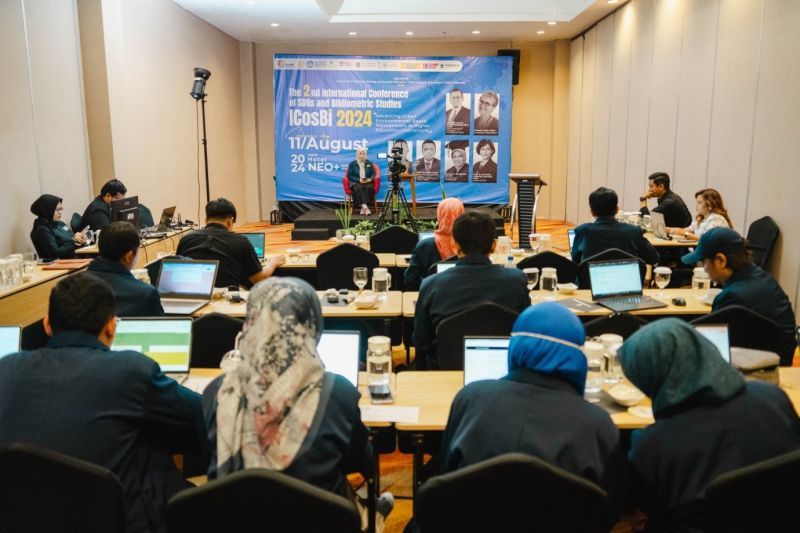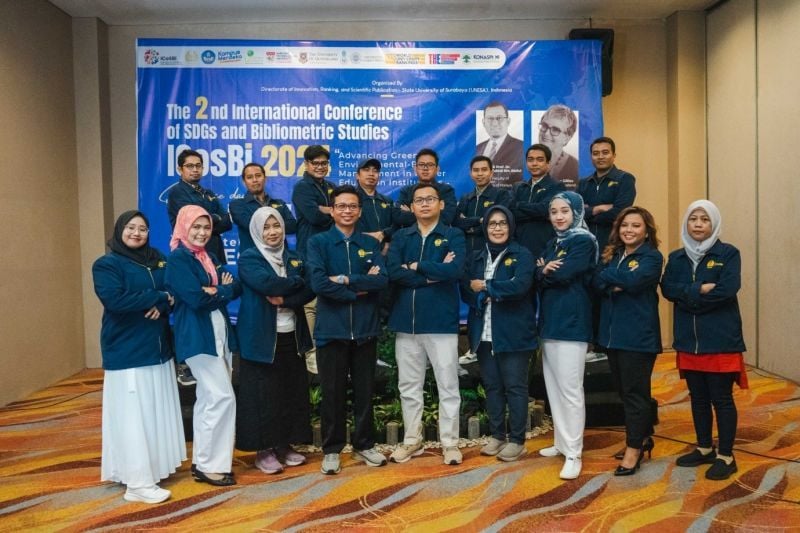UNESA's Commitment to the Environment Highlights at the 2024 International Conference on SDGs and Bibliometrics Studies

Unesa.ac.id., SURABAYA—The State University of Surabaya (UNESA), through the Directorate of Innovation, Ranking, and Scientific Publications, held The 2nd International Conference on SDGs and Bibliometrics Studies (ICOSBI) online on Sunday, August 11, 2024.
The conference with the theme "Advancing Green Environmental Based Management in Higher Education Institutions" was attended by several speakers from various foreign universities.
The keynote speakers were: 1) Assoc. Prof. Dr. M Faizal bin Abdul Ghani, Ph.D., from the University of Malaya, Malaysia; 2) Professor Robyn Gillies from the University of Queensland; and 3) Assoc. Prof. Withawat Khattiyamar from Thaksin University Thailand.
Also present were: 4) Prof. Amrul Riffin Ph.D., Head of Education and Culture at the Indonesian Embassy in Tokyo, Japan; 5) Prof. Dr. Ir. Riri Fitri Sari MM MSc, Director of UI Greenmetric; and 6) Prof. Dr. Ova Emilia, M.Med.Ed., Sp.OG(K)., Ph.D.
Vice Rector III for Research, Innovation, Ranking, Publication and Science Center Bambang Sigit Widodo proudly welcomed all participants of the international conference which was supported by KONASPI XI 2024. He highlighted the important role of universities in achieving the Sustainable Development Goals (SDGs), especially in the ever-changing global situation.
The lecturer from the Faculty of Political and Social Sciences (FISIPOL) appreciated the academics, researchers, policymakers, and students from around the world who enthusiastically participated in this activity. The presence of all participants demonstrated a shared commitment to understanding the challenges of sustainable development while seeking solutions to promote ecological integrity and social justice.
This conference, he added, is expected to be a valuable platform for sharing knowledge, best practices, and innovative approaches in integrating sustainability into the education system. "I hope the discussions and collaborations that take place will contribute significantly to realizing a more sustainable, just, and prosperous future for all," he said.
Professor Robyn Gillies, in the first session, delivered material on the importance of collaborative learning in STEM (Science, Technology, Engineering, and Mathematics) to build connections that can improve the quality of learning. Collaborative learning is a major focus for various reasons rooted in societal expectations, national curriculum, and brain-based research.
Brain-based learning research shows that well-structured group activities can build supportive classroom communities, increase self-confidence, and improve students' academic performance. "This learning not only helps students understand the material, but also develops social and emotional skills that are important for future success," said the professor from the University of Queensland.

In the next session, Ruki Harwahyu highlighted the importance of green-based environmental management programs on campuses. In his explanation, Ruki explained the methodology and indicators used by UI GreenMetric to assess the environmental performance of universities worldwide.
Indonesia, with the participation of its universities including the State University of Surabaya (UNESA), continues to play an active role in improving rankings in this network, as part of global efforts to create more environmentally friendly campuses.
Prof. Ahmad Zabidi bin Abdul Razak explained the importance of the Grounded Theory approach in green environmental management in higher education institutions. Grounded Theory, which is rooted in qualitative research, allows researchers to identify and understand important patterns that can be applied in green environmental management more holistically and contextually.
In his presentation, which focused on a methodological perspective, the professor from Universiti Malaya explained how this approach can be used to develop more effective strategies and policies in supporting environmental sustainability on campuses. "This approach is expected to make a significant contribution to advancing sustainability efforts in the higher education sector," he added.
Prof. Amrul Rifin mentioned the link between economic growth and education. He emphasized how education plays a role as one of the main pillars in driving a country's economic growth, that investment in the education sector can improve the quality of human resources, which in turn contributes to productivity and economic innovation.
In addition, he also discussed how increasing access and quality of education can help reduce social and economic inequality, as well as accelerate the rate of sustainable economic growth.
Eva Anggraini explained how higher education institutions can contribute significantly to achieving global sustainability goals through various initiatives and programs. "Universities not only function as centers for education and research, but also as agents of social change that can influence policies, practices, and public awareness of sustainability issues," said the Director of Global Connectivity.
Next, Withawat Khattiyamar outlined the various significant achievements that have been achieved in his field and how these achievements can influence future developments. He also highlighted the potential for innovation and opportunities that exist, as well as the challenges that need to be faced in order to continue moving forward. This material presentation session provided valuable insights into how past achievements can be a foundation for achieving greater progress in the future.[]
***
Reporter: Prismacintya (FBS)
Editor: @zam*
Photo: UNESA PUBLIC RELATIONS Team
Share It On: